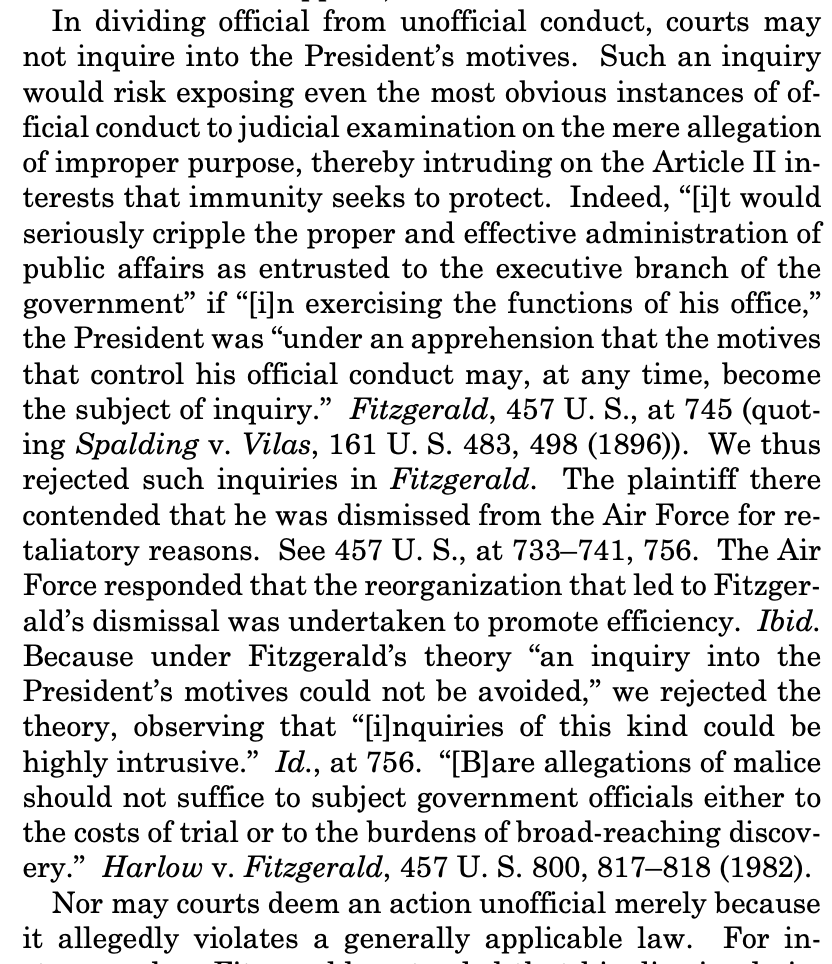@realcaseyrollins@social.teci.world @AltonDooley @realcaseyrollins@noauthority.social @volkris @Hyolobrika So. Much of the decision concerns the distinction between official and unofficial acts. If the President's prosecutions are not in fact to "take Care that the Laws be faithfully executed", in pursuit of violators of law, then you might argue they are not "official acts" at all, and there is no immunity for whatever a President does that is not an official act. 1/
@realcaseyrollins@social.teci.world @AltonDooley @realcaseyrollins@noauthority.social @volkris @Hyolobrika Suppose some prosecution is somehow established not be consistent with "tak[ing] Care that the Laws be faithfully executed". Would instructing an AG to pursue that constitute an official act because it takes the form of an official act (the President instructing a subordinate officer), or by virtue of its deviation from constitutional authority, could be deemed an unofficial act? I don't think the decision is clear. But. 2/
@realcaseyrollins@social.teci.world @AltonDooley @realcaseyrollins@noauthority.social @volkris @Hyolobrika But. The decision is very clear about how one might — or really might not! — establish that an act is not an official act. Let me show you another screenshot. 3/
 Text" In dividing official from unofficial conduct, courts may not inquire into the President’s motives. Such an inquiry would risk exposing even the most obvious instances of of- ficial conduct to judicial examination on the mere allegation of improper purpose, thereby intruding on the Article II in- terests that immunity seeks to protect. Indeed, “[i]t would seriously cripple the proper and effective administration of public affairs as entrusted to the executive branch of the government” if “[ijn exercising the functions of his office,” the President was “under an apprehension that the motives that control his official conduct may, at any time, become the subject of inquiry.” Fitzgerald, 457 U. S., at 745 (quot- ing Spalding v. Vilas, 161 U. S. 483, 498 (1896)). We thus rejected such inquiries in Fitzgerald. The plaintiff there contended that he was dismissed from the Air Force for re- taliatory reasons. See 457 U. S., at 733-741, 756... (truncated due to character limits) Nor may courts deem an action unofficial merely because it allegedly violates a generally applicable law.
Text" In dividing official from unofficial conduct, courts may not inquire into the President’s motives. Such an inquiry would risk exposing even the most obvious instances of of- ficial conduct to judicial examination on the mere allegation of improper purpose, thereby intruding on the Article II in- terests that immunity seeks to protect. Indeed, “[i]t would seriously cripple the proper and effective administration of public affairs as entrusted to the executive branch of the government” if “[ijn exercising the functions of his office,” the President was “under an apprehension that the motives that control his official conduct may, at any time, become the subject of inquiry.” Fitzgerald, 457 U. S., at 745 (quot- ing Spalding v. Vilas, 161 U. S. 483, 498 (1896)). We thus rejected such inquiries in Fitzgerald. The plaintiff there contended that he was dismissed from the Air Force for re- taliatory reasons. See 457 U. S., at 733-741, 756... (truncated due to character limits) Nor may courts deem an action unofficial merely because it allegedly violates a generally applicable law.
@realcaseyrollins@social.teci.world @AltonDooley @realcaseyrollins@noauthority.social @volkris @Hyolobrika Let's emphasize.
1. "In dividing official from unofficial conduct, courts may not inquire into the President's motives."
2. "Nor may courts deem an action unofficial merely because it allegedly violates a generally applicable law." 4/
@realcaseyrollins@social.teci.world @AltonDooley @realcaseyrollins@noauthority.social @volkris @Hyolobrika So.
Suppose you take the most charitable read of the text we discussed before, and claim that a prosecution that had no basis in "tak[ing] Care that the Law be faithfully executed" would be render it an unofficial act, despite appearing from the outside every bit like an official act. 5/
@realcaseyrollins@social.teci.world @AltonDooley @realcaseyrollins@noauthority.social @volkris @Hyolobrika Then for a court to touch the President for that out-of-bounds prosecution, it would have to somehow be established that what appears to be a valid prosecution, based as all prosecutions are on an allegation that the law was violated, is not in fact that. 6/
@realcaseyrollins@social.teci.world @AltonDooley @realcaseyrollins@noauthority.social @volkris @Hyolobrika How, without "inquir[ing] into the President's motives" can you establish that the alleged violation of the law is not only baseless (thin prosecutions happen sometimes, that can't render a prosecution unofficial) but malicious? 7/
@realcaseyrollins@social.teci.world @AltonDooley @realcaseyrollins@noauthority.social @volkris @Hyolobrika Even if you can credibly allege some violation of law by which the President is still ostensibly bound — perhaps the President was bribed to prosecute someone! — that can't weigh into the determination. You can't examine motive, and you can't examine a role in some larger crime. 8/
@realcaseyrollins@social.teci.world @AltonDooley @realcaseyrollins@noauthority.social @volkris @Hyolobrika If you want to read a limitation in the "tak[ing] Care" clause — a reading the decision does not support, because it grants Trump absolute immunity without suggesting the actions he is accused of fall anywhere near inside the "tak[ing] Care" clause — how in practical terms could you demonstrate that the prosecution was an "unofficial act", without inquiring into motive? /fin
@realcaseyrollins@social.teci.world @AltonDooley @realcaseyrollins@noauthority.social @volkris @Hyolobrika ("Nor may courts deem an action unofficial merely because it allegedly violates a generally applicable law." is perhaps responsive to some of @volkris's suggestions of where a limitation might emerge, very early in this thread.)